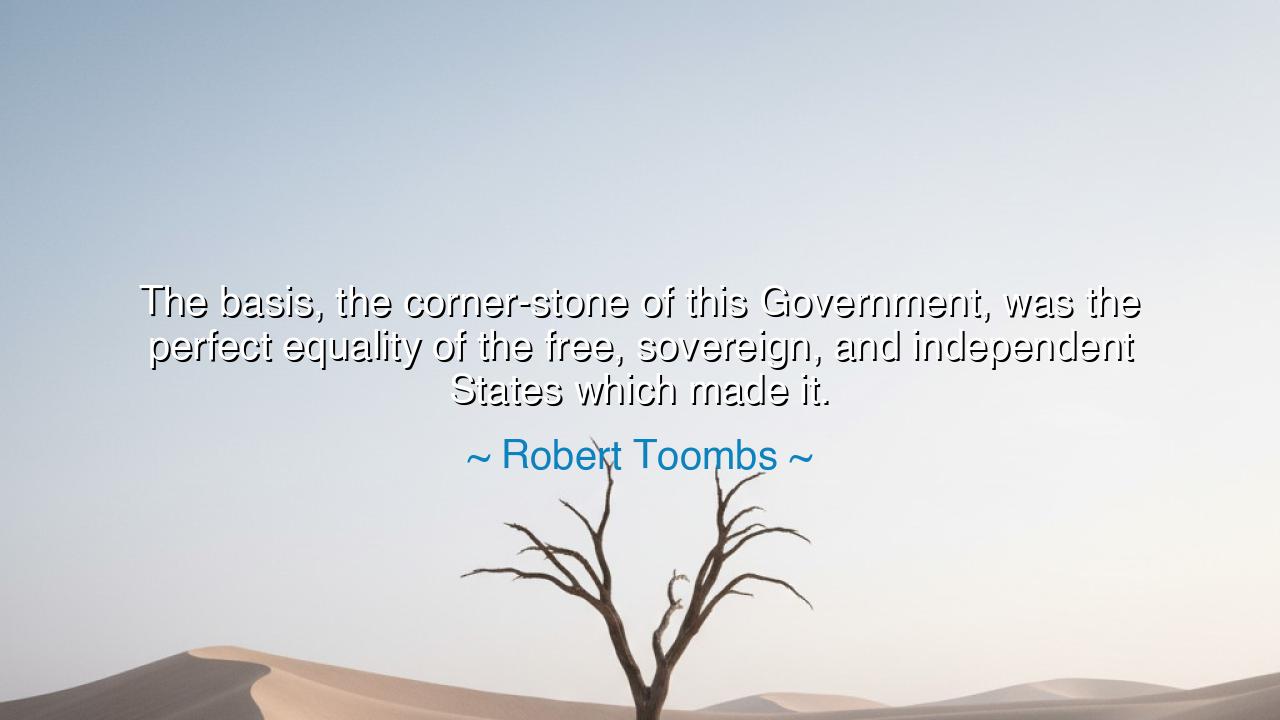
The basis, the corner-stone of this Government, was the perfect
The basis, the corner-stone of this Government, was the perfect equality of the free, sovereign, and independent States which made it.






When Robert Toombs declared, “The basis, the corner-stone of this Government, was the perfect equality of the free, sovereign, and independent States which made it,” he was not speaking idly, nor merely reflecting on a point of law. He was invoking a vision of union and autonomy, a vision born from the founding spirit of the American republic — a confederation of states bound not by subjugation, but by mutual respect and equal dignity. In his words, there resounds both pride and forewarning: pride in the independence that gave birth to the United States, and warning that to forget the principle of equality among states would be to unmake the delicate balance upon which the nation stood.
The origin of this quote lies in the tumultuous years preceding the American Civil War, when Toombs — a Georgian statesman, lawyer, and founding member of the Confederacy — sought to remind his listeners of what he believed was the founding covenant of the nation. For him, the United States had been conceived as a partnership of equals, each state free and sovereign, joining together voluntarily for mutual defense and prosperity. When he spoke of the “corner-stone,” he echoed the language of architects and builders — suggesting that if this equality among the states were ever violated, the entire structure of the republic would crumble. In Toombs’s eyes, the growing power of the federal government and the moral zeal of the North threatened to upend this balance, replacing equality with domination.
Toombs’s interpretation, however, was not without controversy — nor was it free of contradiction. For even as he invoked the language of freedom and equality, his vision excluded the enslaved, upon whose suffering much of the South’s wealth was built. Yet his words, stripped of their historical burden, still speak to an enduring truth about governance and liberty: that any lasting union — whether among states, nations, or people — must rest upon the foundation of equality and mutual consent. The ancients understood this too. The Greek city-states, though often at war, were bound by a shared ideal that no one polis should hold unchecked power over another; and when Athens sought to dominate, the harmony of the Hellenic world collapsed. So too, Toombs warned, might America falter if it ceased to respect the sovereignty of its parts.
In this sense, Toombs’s statement can be seen as a meditation on the fragility of balance — the eternal struggle between unity and independence. Every great civilization must find its equilibrium between the whole and its members. Rome fell, not when its enemies broke its walls, but when its republic ceased to honor the equality of its citizens and provinces, trading shared governance for imperial rule. The same fate, Toombs feared, awaited a United States that forgot the voluntary compact upon which it was founded. His words, therefore, transcend their time: they are a reminder that true strength arises from respect, not coercion.
Yet, like many truths of history, this one is double-edged. For equality, if invoked without justice, becomes an empty ideal. The “perfect equality” of which Toombs spoke was flawed — for it rested upon the denial of equality to millions of enslaved men and women. This is the great irony and tragedy of his philosophy: that in defending the sovereignty of the states, he ignored the sovereignty of the human soul. The ancients would have seen this as hubris — the fatal blindness of those who mistake power for virtue. Equality cannot be reserved for the few; it must reach all, or it becomes a mask for inequality itself.
Nevertheless, Toombs’s words still carry a lesson of warning and wisdom for all generations. They remind us that every government, no matter how mighty, depends upon the consent of its people. When authority grows deaf to the voices of its constituents, when central power forgets the dignity of the smaller communities that compose it, the foundation begins to crack. Whether in nations or families, institutions or alliances, harmony is sustained only when each part is honored as independent yet interdependent. Thus, Toombs’s “corner-stone” becomes not merely a political principle but a spiritual one — the art of balance in all human affairs.
Let this teaching be passed down: equality is both the root and the test of civilization. The equality of states, of peoples, and of hearts — these are the stones upon which all enduring order is built. If one is exalted and another diminished, the structure falters; but if all stand in mutual respect, it endures through the ages. From Toombs’s flawed yet fervent vision, we may draw this enduring truth: that liberty cannot live without equality, and equality cannot survive without justice. Therefore, let every generation labor to preserve both — to guard the corner-stone of its union, and to ensure that it rests upon the broader, nobler foundation of freedom for all.






AAdministratorAdministrator
Welcome, honored guests. Please leave a comment, we will respond soon